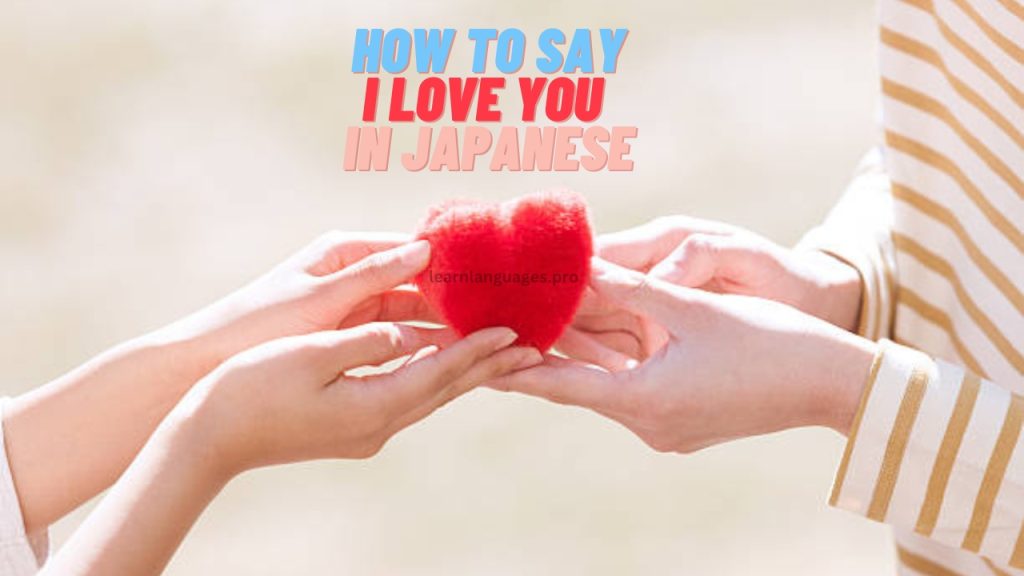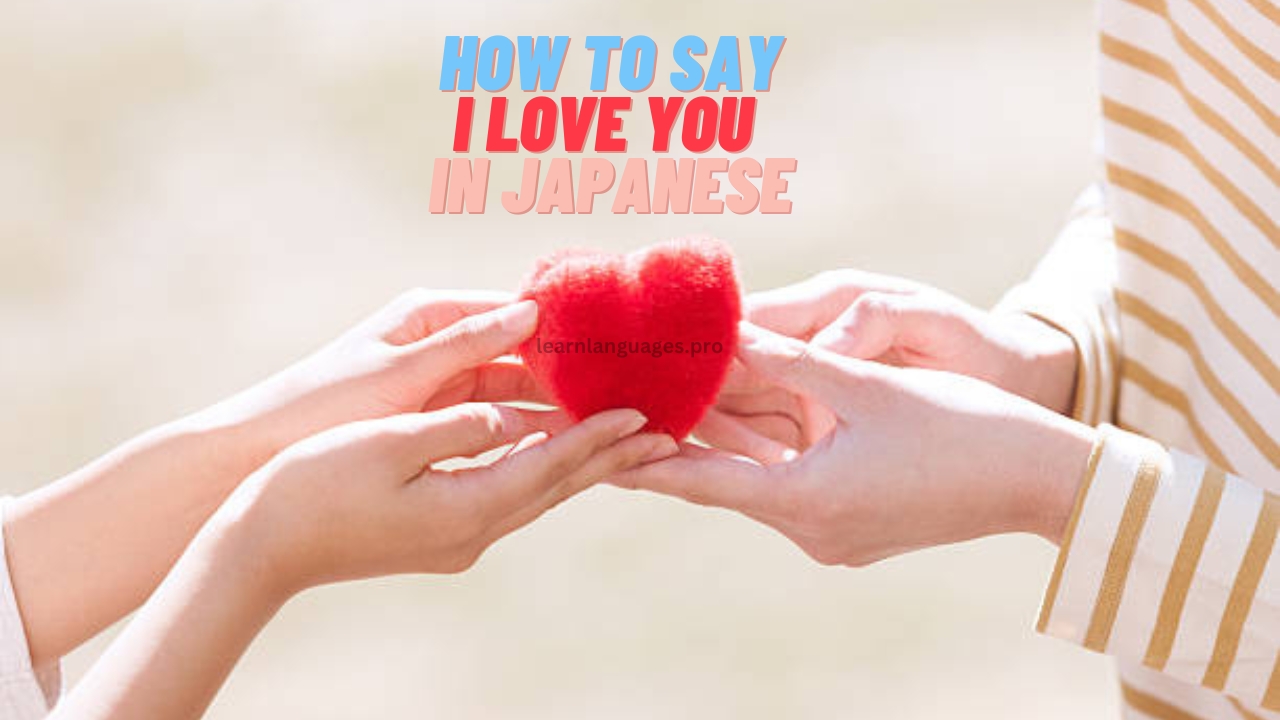Introduction
Love is an all inclusive language, yet the way it’s communicated differs essentially across social orders. In Japanese, communicating love includes a profound comprehension of the language’s specialty and the country’s imaginative ethics. In contrast to English, where ” I love you ” can be expressed unreservedly in brilliant circumstances, Japanese articulations of adoration are more nuanced, smart, and regularly downplayed.
This structure will investigate how to say I love you in Japanese, separating it into verbal fundamentals, creative encompasses, and reasonable activity in various associations and contents. En route, you’ll find the excellence of communicating love in Japanese and learn articulations that convey significant close to home weight.

Direct rehashing of I Love You in Japanese
The immediate rehashing of I love you in Japanese will be ” 愛しています “( Aishiteimasu). This articulation is linguistically right and conveys a profound feeling of heartfelt love. all things considered, it’s not as commonly utilized in that frame of mind as it very well may be in Western social orders. How about we separate it
愛( Artificial intelligence) This word means ” love ” and alludes to significant, persevering through friendship.
しています( Shiteimasu) This is a proper formation of the action word ” する “( suru), meaning ” to do. ” Along with” 愛,” it suggests ” doing cherish ” or ” adoring. “
Casual Varieties to say I Love You in Japanese
愛してる( Aishiteru) A relaxed method for saying I love you in japanese habitually utilized between couples.
愛してるよ( Aishiteru yo) Adding ” yo ” relax the tone and makes it sound more personal.
When to Utilize ” 愛しています “:
This articulation is by and large held for serious or long haul associations, comparable as marriage. It could likewise be utilized in profound circumstances, comparable as an earnest concession or a sensational second in pictures or writing.

The Ordinary Articulations for Communicating Adoration
While ” 愛しています ” conveys profound importance, it’s not the most considered normal method for communicating love in Japanese. rather, individuals utilize further relaxed and socially appropriate articulations.
好きです( Suki desu) – ” I Like You “
This is the most well-known articulation used to communicate heartfelt interest or warmth. However it in a real sense implies ” I like you, ” in heartfelt encompasses, it suggests love.
Delineation:
あなたが好きです( Anata ga suki desu) → I like love you.
君が好きだ( Kimi ga suki da) → I like love you( casual, utilized among close couples).
大好きです( Daisuki desu) – ” I Truly Like You “
By adding ” 大 “( Dai), meaning ” large ” or ” genuinely, ” the articulation becomes more grounded and communicates a more profound place of fondness, much the same as ” I love you ” in English.
Representation:
a way to say i love you in japanese 君が大好きだ( Kimi ga daisuki da) → I truly love you.
These articulations are for the most part utilized in the beginning phases of a relationship or among youngish couples.
Social Setting of Adoration in Japan
Japanese culture puts critical accentuation on trickery and round correspondence, which impacts how love is communicated. Transparently proclaiming ” I love you ” is uncommon contrasted with Western social orders, where it’s said all the more uninhibitedly.
Roundabout Articulation of Affection
Japanese individuals oftentimes accept that direct express stronger than words. rather of continually saying ” I love you, ” they exhibit their affection through motions, comparative as
- food a most loved wreck.
- helping others.
- Giving smart, little gifts.
The piece of Modesty
In Japanese culture, unobtrusiveness is generally esteemed. Communicating sentiments straightforwardly, particularly ware as significant as adoration, may feel excessively courageous or sensational for various individuals.
Respectfulness and Language
Japanese has differing circumstances of amenability, and cherish articulations adjust thusly
Respectful 愛しています( Aishiteimasu) → Held for serious, formal encompasses.
Relaxed 愛してる( Aishiteru) or 好きだ( Suki da) → acclimated in regular associations.
Cozy 大好きだよ( Daisuki da yo) → A sportful, delicate articulation.
The Extraordinary Idea of” Kokuhaku”( Love Admission)
In Japanese seeking society, associations as often as possible start with a ” 告白 “( Kokuhaku), meaning ” concession. ” In contrast to in Western social orders, where heartfelt associations could develop normally, in Japan, it’s standard to proclaim one’s interests before authoritatively beginning a relationship officially.
Representation of a Kokuhaku:
「 好きです 。 付き合ってください 。 」( Suki desu. Tsukiatte kudasai.)
→ I like you. Kindly go out with me.
Reactions to Kokuhaku:
Positive: 「 私も好きです 。 」( Watashi mo suki desu.) → I like you as well.
Negative: 「 ごめんなさい 。 」( Gomen nasai.) → Please accept my apologies( dismissal).
This organized methodology ponders Japanese culture’s accentuation lucidity, regard, and aggregate getting it.
Circumstances of saying I love you in Japanese Language

The Japanese language gives brilliant terms and articulations to depict various circumstances and kinds of affection
恋( Koi) – Heartfelt Love
Alludes to the energetic or hankering part of affection, regularly connected with the beginning phases of a relationship.
delineation 恋人( Koibito) → Heartfelt mate or nut.
愛( man-made intelligence) – Profound, Serious Love
Addresses create, getting through adoration set up in serious associations or marriage.
Model 愛する( simulated intelligence suru) → To profoundly cherish.
Articulations of saying I love you in Various associations
Love is communicated else relying upon the idea of the relationship
Heartfelt associations
Beginning phase Use articulations like 好きです( Suki desu) or 大好きです( Daisuki desu).
Serious Stage Use 愛しています( Aishiteimasu) for a more profound protestation of adoration.
Family associations
Love inside families is less passed. rather, it’s appeared through appreciation and care.
representation 「 ありがとう 。 」( Arigatou.) → Thank you( deducing adoration and appreciation).
gemütlichkeit
Utilize easygoing articulations like 「 好きだよ 。 」( Suki da yo) to communicate dispassionate fondness.
Saying I love Youin japanese with Western Culture
In Western social orders, ” I love you ” is every now and again utilized continually and in vivid encompasses, from heartfelt to homegrown. In disparity
Japanese individuals express love less verbally and further through direct.
Words like ” 好き “( Suki) and ” 大好き “( Daisuki) are liked for their cleverness.
Functional Ways to say I Love you in Japanese
Begin with” 好きです” It’s a protected and regular method for communicating your interests.
Comprehend Setting Utilize the pertinent articulation relying upon the relationship and circumstance.
Be uncertain of Tone and conveyance matter significantly in Japanese.
Appear Through direct Salute your words with significant signals.
The meaning of Truthfulness
In any case of the articulation you pick, earnestness is significant. Japanese individuals esteem certified sentiments over flashy confirmations, so a genuine articulation, without a doubt if basic, will convey incredible significance.
Conclusion:
Saying i love you in Japanese is a workmanship that consolidates verbal flawlessness, creative comprehension, and earnest inclination. Whether you use ” 愛しています, ” ” 好きです, ” or ” 大好きです, ” what makes the biggest difference is the earnestness behind your words and lead.
By embracing the creative subtleties and specialty of the Japanese language, you can convey love in a way that is profoundly significant and regardful to Japanese customs. Love, all things considered, is n’t just about words yet in addition about getting it, direct, and association


